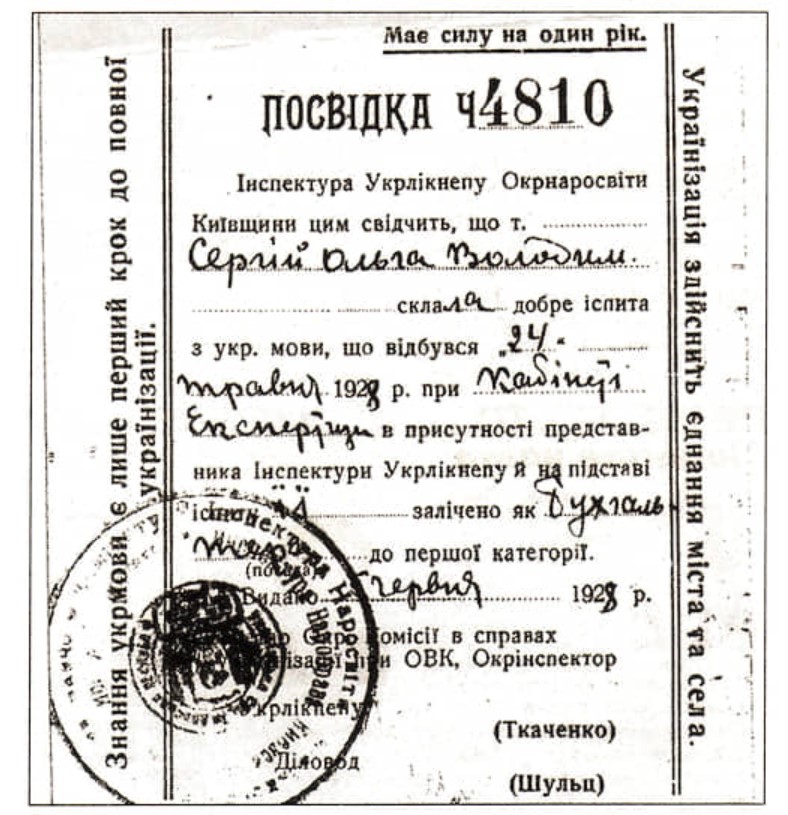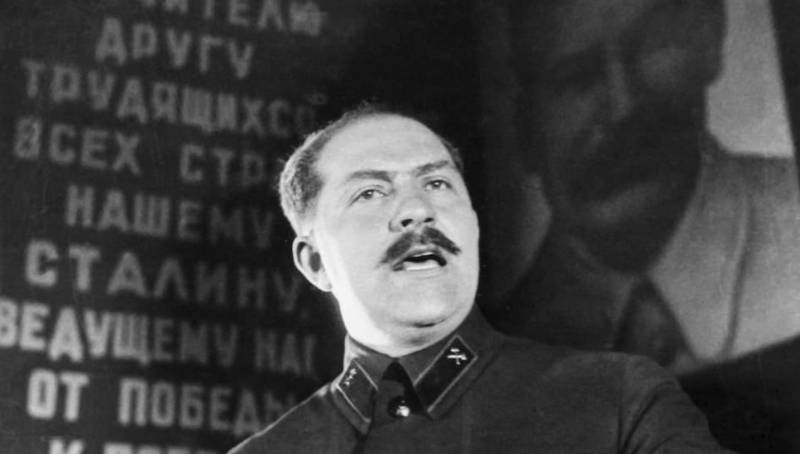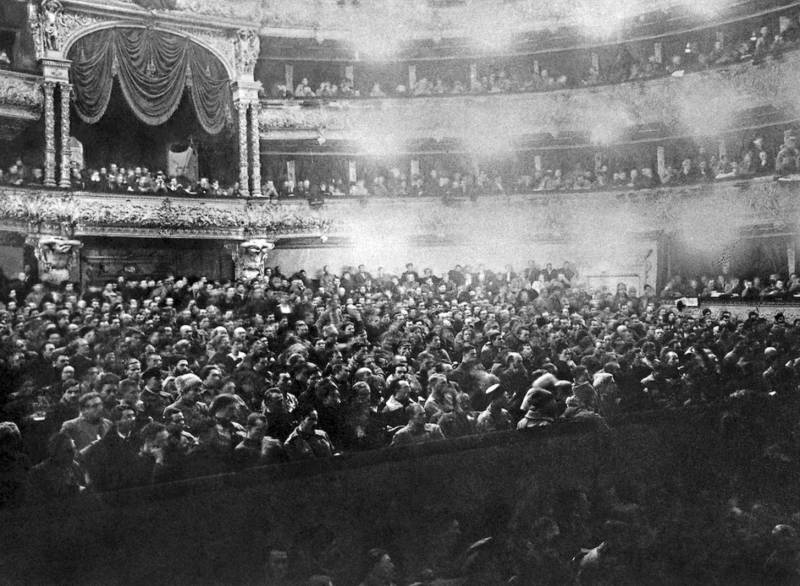Inconvenient nation. Harvard professor - about the "Russian question"
Finds of Professor Martin
The abundance of documents confirming each thesis of the monograph, the best evidence of how gratefully and scientifically strictly Harvard professor managed the knowledge that he could learn from the state archives of Ukraine and Russia. The monograph covers the entire pre-war Stalin era and all the nationalities of the USSR, but its main outline is the relationship between the two key republics of the Union: the Ukrainian SSR and the RSFSR. And the personal motive (“I, whose ancestors left Russia and Ukraine only two generations ago”) clearly confirms the scientist’s conclusion: the strength of the Soviet foundation depended primarily on the strength of Ukrainian-Russian relations.
An important innovation of the work is that Terry Martin decisively translates party style and attitudes of centuries ago into the language of modern politics. "The Soviet Union as a multinational entity is best defined as an empire of positive activity (Affirmative Action Empire)," he proclaims. And he explains that he borrowed this term from the realities of American politics - it is used to denote the policy of providing benefits to various, including ethnic, groups.
This is not about equal chances, but about the Affirmative Action - the concept included preferences, "positive (positive) action." Terry Martin calls this a historic premiere and emphasizes: not a single country has yet caught up with Soviet endeavors in scale.
In 1917, when the Bolsheviks seized power, they did not have any consistent national policies. There was only an “impressive slogan” - the right of nations to self-determination. He helped mobilize the masses of national suburbs to support the revolution, but he was unsuitable for creating a model for managing a multinational state - the state itself was then doomed to collapse.
The fact that Poland and Finland (who were in the empire, as a matter of fact, on a federal basis) were the first to try to “drive off”, was expected. But the process did not stop there - they went further, and the surge of nationalist movements in most of the former Russian Empire (especially in Ukraine) caught the Bolsheviks by surprise. The answer to it was a new national policy formulated at the XII Party Congress in April 1923. Its essence, Terry Martin, based on documents, is formulated as follows: "to maximize support those forms of national structure that are not in conflict with the existence of a unitary centralized state." Under this concept, the new authorities announced their readiness to support the following “forms” of the existence of nations: national territories, languages, elites and cultures. The author of the monograph defines this policy with a term that previously had not sounded in historical discussions: “territorialization of ethnicity”. What is meant by it?
Ukrainian locomotive
“Throughout the Stalin period, the central place in the evolution of Soviet national politics belonged to Ukraine,” says the professor. It’s clear why. According to the census of the 1926 year, Ukrainians were the largest titular nation in the country - 21,3 percent of the total population (Russians were not considered as such, since the RSFSR was not a national republic). Ukrainians constituted almost half of the non-Russian population of the USSR, and in the RSFSR they exceeded any other national minority by at least twice. Hence all the preferences that Soviet national policy allotted to the Ukrainian SSR. In addition to the internal one, there was also an “external motive”: after millions of Ukrainians, as a result of the Riga Treaty of 1921 of the year, ended up within Poland, Soviet national policy was inspired for a good ten years by the idea of a special attitude towards Ukraine, an example of which should become attractive for related diasporas abroad.
“In the Ukrainian political discourse of the 20's,” writes Terry Martin, “Soviet Ukraine was seen as the new Piedmont, Piedmont of the twentieth century.” Piedmont, recall, is the area around which in the middle of the XIX century there was a unification of all of Italy. So the allusion is transparent - a similar perspective was drawn by Soviet Ukraine.
Such an attitude, however, alarmed the politicians of neighboring states and the West as a whole. An active struggle has unfolded against the "Bolshevik infection" in all its manifestations, and counterplay has also arisen - a response bet on nationalism. And it worked: if in the 1920's the ethnic ties of Soviet Ukraine with the large Ukrainian population of Poland, Czechoslovakia, Romania were considered the Soviet foreign policy advantage, then in the 1930's they were regarded in the USSR as a threat.
Corrections also required “internal practices”: referring to the same Piedmont principle, the Ukrainian, and the Belarusian leadership, aimed not only at their foreign diasporas, but also at diasporas within the Union. And this meant claims on the territory of the RSFSR.
Having studied the history of the movement of internal Soviet borders, the researcher concludes: “Throughout the USSR, borders were drawn in favor of the territories of national minorities and at the expense of the Russian regions of the RSFSR. There were no exceptions to this rule. ” Such pliability continued until 1929, when Stalin admitted: the constant redrawing of internal borders did not contribute to attenuation, but to exacerbation of ethnic conflicts.
Assortment rooting
Further analysis leads Professor Martin to a paradoxical conclusion. Uncovering the miscalculations of the Bolshevik project, which began with the wonderful ideals of “positive activity,” he writes: “The Russians in the Soviet Union have always been an“ uncomfortable ”nation — too big to ignore, but too dangerous to afford it the same institutional status as the other major nationalities of the country. ” That is why the founding fathers of the USSR “insisted that the Russians should not have their own full-fledged national republic, or all other national privileges that were given to the other peoples of the USSR” (among them - the existence of their own communist party).
In fact, two federal projects appeared: the main one - the Union and the subcontracting - Russian (only formally equated to other republics). And in the end (and this the professor defines as the main paradox), laying on the shoulders of the "great-power" Russian people the historical blame for the oppression of the national outskirts, the Bolshevik party was able to preserve the structure of the previous empire in this way. It was a strategy of retaining power in the center and in the localities: at all costs to prevent the centrifugal nationalism of non-Russian peoples. That is why at the XII Congress, the party declared the development of national languages and the creation of national elites as the primary program. In order for the Soviet government to appear to be its own, indigenous, and not “newcomer”, “Moscow” and (God forbid!) “Russian”, this policy was given the general name “indigenous”. In national republics, neologism was transformed by the name of the titular nations - “Ukrainization”, “Belarusianization”, “Uzbekization”, “Oyrotization” (Oyroots - the ancient name of the Altaians. - “O”), etc.

Certificate on the passing by an accountant Sergey Olga Vladimirovna of exams for knowledge of the Ukrainian language, without which they could not accept a job. Kiev region, 1928. Captions: "Ukrainization will make the unification of the city and the village" and "Knowledge of the Ukrainian language is only the first step to complete Ukrainization." The surname of the recipient is also Ukrainianized
From April 1923 to December 1932, central and local party and Soviet bodies issued hundreds of decrees and thousands of circulars that develop and promote this directive. It was about the formation in the territories of a new party and administrative nomenclature (relying on a national emphasis in personnel selection), as well as the immediate expansion of the use of languages of the peoples of the USSR.
Project misfire
As Professor Martin notes, indigenization was popular among the population of non-Russian periphery and relied on the support of the center, but still ... failed almost everywhere. The process was slowed down to begin with (including directive too - along the party-administrative line), and then turned off in the end. Why?
First, utopia is always difficult. In Ukraine, for example, the goal was set to achieve one hundred percent Ukrainization of the entire administrative apparatus in a year, but the implementation schedule had to be postponed many times, without achieving what was desired. Secondly, forced indigenization generated resistance from influential groups (the professor lists them in the following order: city workers, office staff, industrial specialists, employees of branches of all-Union enterprises and institutions), who were not worried about utopia at all, but the real prospect would be to dismiss up to 40 percent employees of the republic. Yes, and the memory of recent dashing years was still very lively, not without reason the first secretary of the Central Committee of the Communist Party (Bolsheviks), U Emmanuel Quiring, publicly expressed concern that “communist Ukrainization could develop into a Petlyura’s Ukrainization.”
To straighten the dangerous roll, the Politburo sent Lazar Kaganovich to Ukraine, assigning him the title of General Secretary (!) Of the Central Committee of the Communist Party (Bolsheviks) U. As part of the “course correction”, the party was satisfied with the Ukrainian nomenclature majority of 50 – 60 percent, and on this unfinished note 1 of January 1926 of the year, the successful completion of the rooting in the republic was announced. Its result, among other things, was “re-Ukrainianization of the Russified masses”, although incomplete (the historian, quoting documents, writes about 80 percent of the population recorded in Ukrainians). Which meant the transformation of Russians in Ukraine into a national minority (following Ukraine and following its example, the status of a national minority to its Russian fellow citizens - “destitute Russians,” as Terry Martin puts it, was also appropriated by Belarus).

When the scope of indigenization took alarming proportions, the party intervened. So in Ukraine appeared his general secretary - Lazar Kaganovich
Photo: Photo archive of the magazine "Spark"
This triggered the emergence and strengthening of a national-communist bias in the party and Soviet administrative structures of Ukraine, which, according to a Harvard professor, had progressed at such a pace and became so massive that it finally aroused "growing concern" in Stalin.
To the very suburbs
What "scale" are we talking about? About the All-Union, no less. And many interesting pages are devoted to this in the monograph of the Harvard professor, which are read almost like a detective story. Judge for yourself.
The Bolshevik leaders, Terry Martin writes, "did not recognize either the assimilation or the extraterritorial existence of a nationality." With these standards, they began to build the Soviet state: each nationality has its own territory. True, not everyone was lucky: having created relatively easily 40 large national territories, the Soviet government came up against the problem of national minorities, which in Russia alone are like sand in the sea. And if for Soviet Jews, for example, it was possible to create the Birobidzhan Autonomous Region, then it did not work out with the Gypsies or, say, the Assyrians.
Here the Bolsheviks showed the world a radical approach: to extend the Soviet national-territorial system to the smallest territories - national regions, village councils, collective farms. In advanced Ukraine, let’s say, the Gypsy did not work with the republic, but one gypsy village council and as many as 23 gypsy collective farms were created. The algorithm worked: tens of thousands of national (albeit conditional) borders swept the Russian Federation, and it was the Ukrainian system of territorial national councils that was taken as a model - in May of the 1925, the III All-Union Congress of Soviets declared it mandatory for the entire USSR.
Considering that in the middle of the 1920’s 7 873 331 was a Ukrainian living in the RSFSR, the “Ukrainian Piedmont” did not extend its influence beyond the borders of the USSR, as it was intended, but to the regions of the USSR - to where considerable masses of Ukrainian migrant peasants had concentrated before the revolution (Lower Volga, Kazakhstan, South Siberia, Far East). The effect was impressive: according to Terry Martin’s calculations, at least 4 of thousands of Ukrainian national councils appeared in the RSFSR (while the Russian minority in Ukraine did not achieve the right to form at least one city national council), which took full agreement with the idea of “territorializing ethnicity” Ukrainization of occupied territories. It is no coincidence, the professor notes, “the teachers became the most important export item of Ukraine to Russia” (the historian confirms this thesis with statistics: in the 1929 / 30 academic year there were no Ukrainian schools in the Far East at all, but two years later there were 1076 elementary and 219 Ukrainian secondary schools; in 1932, more than 5 thousand Ukrainian teachers arrived in the RSFSR on their own initiative).

In the middle of the 1920, Ukrainization went beyond Ukraine, encompassing the Kuban, Stavropol and even the Far East. Employees were also obliged to take exams in Ukrainian studies, and teachers shared their experience in such newsletters
Against the backdrop of the development of such processes, is it worth wondering about Stalin's “growing concern”? She ultimately turned into a condemnation of "creeping nationalism, only covered by a mask of internationalism and the name of Lenin." In December of the 1932, the Politburo adopted two decisions directly criticizing Ukrainization: they, Terry Martin notes, announced the “crisis of the empire of positive activity” - the indigenous project was, in fact, curtailed ...
Why did the Soviet people not take place
The Bolsheviks began their policy on the national question with a beautiful utopia, which, soberly, they spent 15 years on. The project of the “international of nations”, in which territories, population and resources were transferred from one to another “brotherly”, turned out to be a unique experiment - there was nothing like this anywhere else in the world. True, this project did not become a precedent for humanity: the Soviet government itself reformatted its own national policy at the end of the 1932, three months before fascism came to power in Germany (whose racial theory, by the way, was not a single nationality of the USSR left no place, no choice). Now it is possible to evaluate that Soviet national project in different ways, but it should be noted that if it consisted of failures alone, the war against fascism would not become Patriotic, and victory would be popular. So the “Soviet childhood” of the peoples of the USSR was at least not in vain for their common destiny.
But still. Why didn’t the “Soviet people” come about, although for seven decades this term did not go from the pages of newspapers and was spoken in official reports? It follows from Terry Martin's work: there were attempts to establish a unified Soviet nationality, even the overwhelming majority in the party stood for it, but at the threshold of the 1930's, Stalin himself rejected this idea. His motto: the international of peoples - yes, internationalism without nations - no. Why did the leader, neither with people nor with peoples, stand on ceremony, made such a choice? Apparently, he thought: reality mattered more than party directives.
But in the years of stagnation, other Soviet leaders still decided to reprint the old utopia: the third constitution of the USSR, adopted under Brezhnev in the 1970, introduced into the legal field "a new historical community of Soviet people." But if the initial project proceeded from naive ideas about the paths to the "bright future" of a multinational country, then its senile copy looked like a caricature: it simply gave out wishful thinking.
Those national problems that were overcome at the level of the “empire of positive activity” sparked at the level of national republics. Andrei Sakharov said very precisely about this, commenting on the first interethnic conflicts in the post-Soviet space: they say it’s a mistake to think that the USSR fell into Ukraine, Georgia, Moldova, etc .; he broke up into many small Soviet Unions. The problem with the “uncomfortable” nation for the Bolsheviks — the Russians — also played a sad role. Having begun to build the Soviet empire on the basis that the Russians “owe everything”, they laid a mine for the future. Even having reviewed this approach in the 1930's, the mine was not neutralized: as soon as the Union collapsed, it turned out that the "elder brother" owed everything to everyone.
Terry Martin in his monograph refutes these claims, citing various evidence and facts. And how can one not recall the new ones recently opened in the archives: in 1923, simultaneously with the development of its national concept, the Soviet government also established a subsidy fund for the development of the Union republics. This fund was declassified only in 1991 after the report of Prime Minister Ivan Silaev to President Boris Yeltsin. When the expenses were converted from it at the 1990 exchange rate of the year (1 US dollar cost 63 kopecks), it turned out that 76,5 billion dollars were sent to the Union republics annually. This secret fund was formed exclusively at the expense of the RSFSR: out of every three rubles earned, the Russian Federation kept only two for itself. And for almost seven decades, every citizen of the republic gave 209 rubles annually to his brothers in the Union — more than his average monthly salary ...
The existence of a subsidy fund explains a lot. Well, for example, it becomes clear how, in particular, Georgia could bypass the Russian figure by 3,5 times in terms of consumption. For the rest of the fraternal republics, the gap was less, but they were the “record holder" successfully catching up with all the Soviet years, including the period of Gorbachev perestroika.

Information